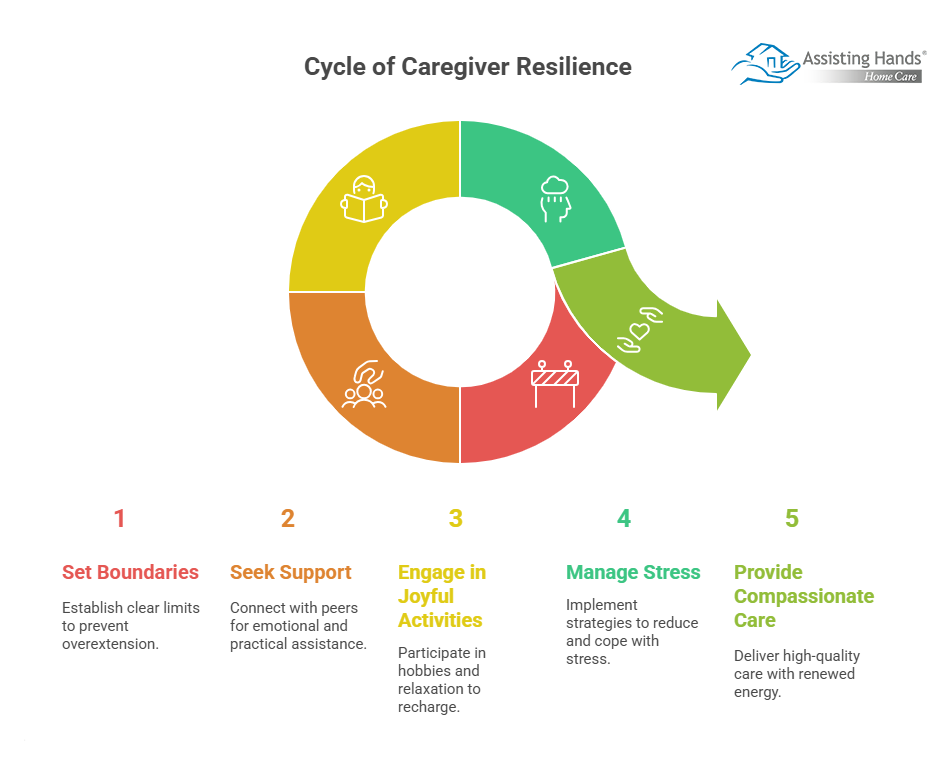
Table of Content
Caregiving is often a rewarding but demanding role, requiring unwavering emotional and physical commitment. Balancing the needs of others while maintaining your own wellbeing can feel overwhelming, making emotional resilience an essential skill. Here, we’ll explore key strategies to help caregivers build resilience, enabling them to thrive while supporting loved ones.
Understand Emotional Resilience
At its core, emotional resilience is the ability to adapt to stress, adversity, and difficult situations. For caregivers, this means processing challenges while maintaining a sense of balance and emotional strength. It’s not about avoiding hardships but effectively managing emotions and bouncing back stronger after setbacks. Understanding this concept is the first step toward becoming more resilient in your caregiving role.
Recognize and Manage Stress
Caregiving comes with its share of stressors, from juggling daily responsibilities to facing unpredictable situations. Recognizing the signs of stress is critical—these might include fatigue, irritability, or feelings of helplessness.
Strategies to effectively manage stress include:
- Practicing mindfulness – Take a few minutes each day to focus on your breathing or meditate to ground yourself.
- Seeking support – Connecting with a friend or joining a caregiver support group can provide both emotional relief and new perspectives.
- Setting boundaries – It’s okay to say no to additional tasks or responsibilities when you’re stretched thin.
If you’re feeling stressed and overwhelmed by your caregiving responsibilities, a professional caregiver can provide the support and encouragement you and your loved one need. Families looking for top-rated senior care providers can reach out to Assisting Hands Home Care. From respite care to specialized Alzheimer’s, dementia, stroke, and Parkinson’s care, there are many ways we can make life easier for seniors and their loved ones.

Cultivate Self-Care Habits
While caregiving often demands putting others first, it’s vital to prioritize your own wellbeing. Self-care is a necessity for sustaining your role as an effective caregiver.
Ideas for self-care:
- Schedule regular physical activity, such as walking, yoga, or swimming.
- Foster hobbies or activities that bring you joy outside of caregiving.
- Ensure you get adequate sleep to recharge your mind and body.
- Take time for healthy meals, focusing on balanced nutrition to sustain energy.
Small moments of self-care can have a cumulative positive effect, helping you stay emotionally balanced and present.
Family caregivers need to care for their own wellbeing. If you’re caring for an aging loved one and are feeling overwhelmed, consider hiring a professional caregiver to provide respite care. Naples families who want to prevent burnout can turn to Assisting Hands Home Care. One of our professional caregivers can assist your loved one at home while you take a nap, go to work, run errands, or go on vacation.
Develop a Support Network
Caregiving doesn’t need to be a solo endeavor. Building a reliable support network can ease the emotional and physical burden of caregiving.
Create your circle of support:
- Family and friends – Reach out to those you trust for help with tasks, a listening ear, or even temporary respite.
- Healthcare professionals – Collaborate with doctors, counselors, or social workers for tailored advice and coping strategies.
- Caregiver groups – Online and local caregiver support communities often provide a sense of belonging and shared understanding.
Having a reliable network means you’re not navigating the caregiving experience entirely on your own.
Practice Emotional Expression
Bottling up your emotions can lead to burnout. Emotional resilience requires acknowledging how you feel and finding healthy outlets to express those emotions.
Ways to express emotion:
- Journaling can help you process thoughts and release tension.
- Talking to a therapist provides a safe, nonjudgmental environment to explore feelings.
- Creative outlets such as art, music, or crafting allow you to channel emotions productively.
Expressing emotions isn’t a sign of weakness but a strength that helps you gain clarity and move forward.
Seniors can face a variety of age-related challenges. Though some families choose to take on the caregiving duties, there may come a time when they need a trusted Naples homecare provider. Families sometimes need respite from their duties so they can focus on their other responsibilities, and some seniors need around-the-clock assistance that their families are not able to provide. Assisting Hands Home Care is here to help. Call us today to discuss how we can give you the peace of mind that comes from knowing your loved one is being cared for with professionalism and compassion.







